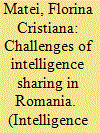| Srl | Item |
| 1 |
ID:
090546


|
|
|
|
|
| Publication |
2009.
|
| Summary/Abstract |
The twenty-first century's security environment has triggered a phenomenon of 'proliferation' of intelligence and security cooperation, both domestically and internationally. After the ousting of the communist regime (whose intelligence system served the regime) in 1989, Romania embarked upon democratic reform of its new intelligence system (including strengthening cooperation), to better tackle the current security challenges. This has been a rather onerous process, yet worthwhile: Romania's intelligence is presently cooperating well with national and international partners, to counter national, regional, and global security threats. This paper assesses Romania's efforts in developing intelligence cooperation, after the demise of the communist regime.
|
|
|
|
|
|
|
|
|
|
|
|
|
|
|
|
| 2 |
ID:
090547


|
|
|
|
|
| Publication |
2009.
|
| Summary/Abstract |
Authenticity of a document alleged to be a transcript of a 26 November 1941 telephone call between Churchill and Roosevelt is assessed using a 'diplomatics' approach. If genuine, this document would have transforming historical significance since it is dated well before the attack on Pearl Harbor and, taken at face value, serves as evidence that Roosevelt had specific prior warning of the impending attack. A detailed analysis of form, content and provenance establishes that the document is not authentic.
|
|
|
|
|
|
|
|
|
|
|
|
|
|
|
|
| 3 |
ID:
090545


|
|
|
|
|
| Publication |
2009.
|
| Summary/Abstract |
During the opening stages of the Pacific War, between December 1941 and spring 1942, the Imperial Japanese Army appeared unstoppable. US forces in the Philippines, despite their efforts, could not hold out against the enemy advance, and by April the last vestiges of their resistance at Bataan and Corregidor became untenable. The intelligence obtained during the initial encounters provided the US defense establishment with undeniable reasons to conclude that Japanese ground forces possessed a high level of tactical skill, and assessments of the Imperial Japanese Army tended to exaggerate the latter's capabilities.
|
|
|
|
|
|
|
|
|
|
|
|
|
|
|
|
| 4 |
ID:
090541


|
|
|
|
|
| Publication |
2009.
|
| Summary/Abstract |
Both US intelligence officials and intelligence studies scholars claim that 'organizational culture' is a cause of 'intelligence failure' and the proper locus of post-9/11 intelligence reform efforts. This essay uses a postmodern perspective to demonstrate how the dominant discourse of 'organizational culture' shapes stakeholders' understandings of accountability and what constitutes necessary, correct, or effective intelligence reform. By exploring institutional struggles over the meanings of 'culture' and 'accountability', this essay calls for reconsideration of the ways US intelligence officials and intelligence studies scholars talk about 'organizational culture' vis-a-vis post-9/11 intelligence reform.
|
|
|
|
|
|
|
|
|
|
|
|
|
|
|
|
| 5 |
ID:
090542


|
|
|
|
|
| Publication |
2009.
|
| Summary/Abstract |
Despite the controversy that will inevitably continue to surround Britain's use of executive detention to contain domestic fascists during the Second World War, recently declassified Security Service (MI5) records reveal the details of MI5's role in the defence regulations. MI5 was one of three bodies responsible for the administration of Defence Regulation 18b (DR18b) and as such its power was limited by an inherent system of checks and balances. As others have suggested, the administration of DR18b was full of tension; however, it is now apparent that this tension was a positive feature of the defence regulations and one that protected the individual rather than condemned him. The strategic detention of key figures from Britain's fascist circles effectively destroyed the ability of fascists to function in unified organizations. Newly available records provide answers to previously unanswerable questions related to the nature of the fascist threat as it was perceived and as it changed throughout the war.
|
|
|
|
|
|
|
|
|
|
|
|
|
|
|
|
| 6 |
ID:
090544


|
|
|
|
|
| Publication |
2009.
|
| Summary/Abstract |
This paper describes how political intelligence evolved in Singapore and the establishment for the first time of a political intelligence bureau, the forerunner of the Singapore Police Special Branch and the present-day Internal Security Department (ISD). It is an example of British imperial practice as the early roots of intelligence in Singapore owed much to the experience gained earlier in British India in dealing with intelligence matters. The establishment of an intelligence bureau in Singapore came about as a direct result of the Singapore Mutiny (15 February 1915), and in the following year the newly-established bureau was renamed the Criminal Intelligence Department and absorbed into the Straits Settlements Police. In September 1933, it became the Singapore Special Branch, the forerunner of present-day Singapore's Internal Security Department.
|
|
|
|
|
|
|
|
|
|
|
|
|
|
|
|